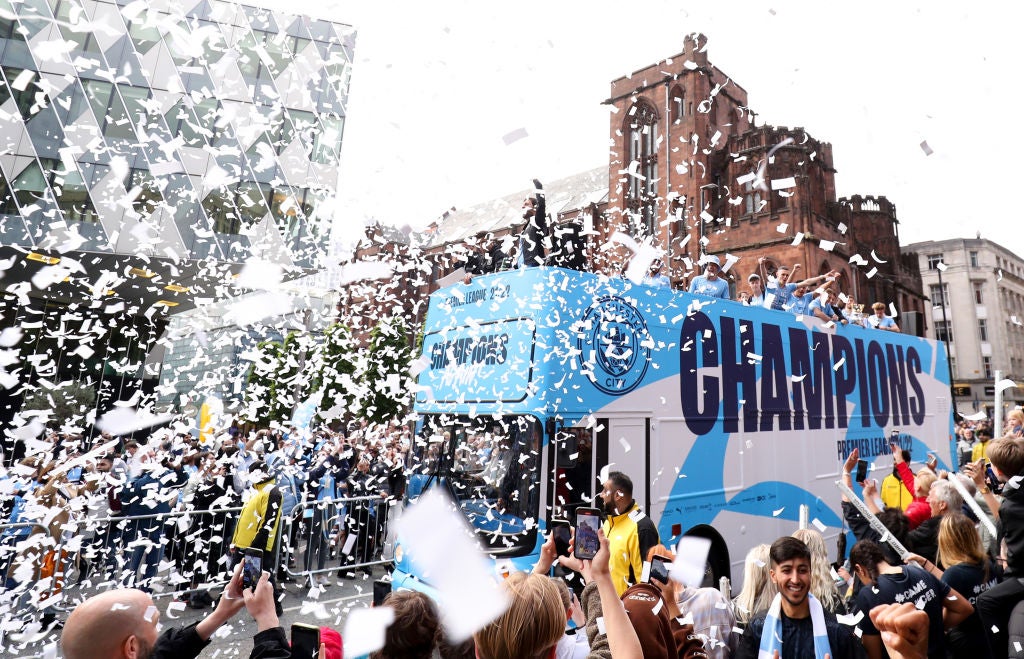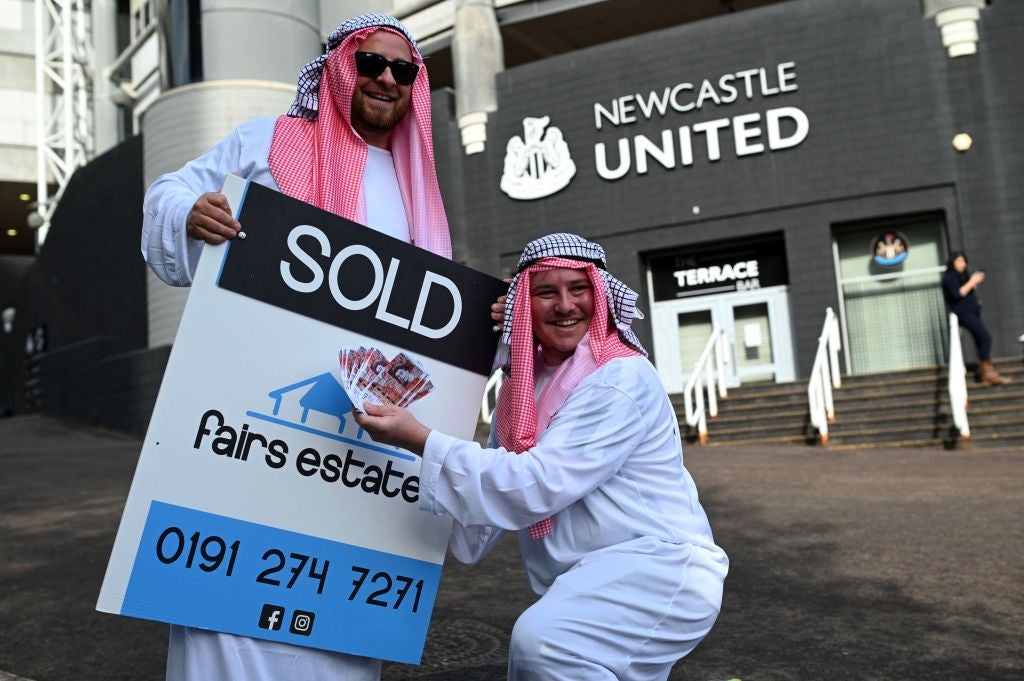Qatar takeover of Man United would be new low for English football
Manchester United would no longer just be about Salford, Manchester and the community of fans
Your support helps us to tell the story
From reproductive rights to climate change to Big Tech, The Independent is on the ground when the story is developing. Whether it's investigating the financials of Elon Musk's pro-Trump PAC or producing our latest documentary, 'The A Word', which shines a light on the American women fighting for reproductive rights, we know how important it is to parse out the facts from the messaging.
At such a critical moment in US history, we need reporters on the ground. Your donation allows us to keep sending journalists to speak to both sides of the story.
The Independent is trusted by Americans across the entire political spectrum. And unlike many other quality news outlets, we choose not to lock Americans out of our reporting and analysis with paywalls. We believe quality journalism should be available to everyone, paid for by those who can afford it.
Your support makes all the difference.A Qatari state takeover of Manchester United would be nothing short of an English football travesty.
This is a moment of enormity for the sport. The concern is two-fold, both having a multiplying effect on the other to pose a potentially irreversible impact on the game. At its moral core, there is English football’s biggest club being made to represent the biggest problem in football right now. United would be politically used to mitigate one of the most criticised human rights records on earth, centred on a labour system described as modern slavery, consequently making this noble institution complicit.
United would no longer just be about Salford, Manchester and a community of fans thrilled by a glorious history of adventure and defiance. It would be about Qatar, its foreign policy and the kind of issues that just shouldn’t be a concern for football. “Sportswashing” is too soft a description for what is actually happening here, especially when you consider the other issue.
The purchase of United by a state bid would mean the three primary countries driving the Gulf blockade all finally own major clubs in England, including the biggest of all. What would it say for what the Premier League is? The most watched league in the world would become the most morally compromised, by far greater degrees. The competition would be turned into a political arena. Manchester would be turned into a political arena. Nobody should be under any illusions about that.
That’s even before you get to the actual cost for the game. It would represent total surrender to repressive regimes, and potentially make it almost impossible for anyone else to compete. The Qatari hierarchy in charge of Paris Saint-Germain after all purchased Neymar for a world record signing in part because they knew if wages and fees were inflated so high that only a handful of clubs would be able to match them. This would narrow that field further, all the more so as it would match the unlimited funds of one of the world’s main oil economies with a football financial juggernaut. This is not sport.
And nobody should be under any illusions about the nature of the bid. As with Sheikh Mansour at City, Sheikh Jassim Bin Hamad Al Thani would merely represent a conduit for state power. Qatar’s sporting ambition is now well known. It is meanwhile easier to see why so many sources played down the idea that a state fund like Qatar Investment Authority or Qatar Sports Investments. It makes it easier to position this as separate to the PSG ownership. Make no mistake, everything would run back to the Emir. This is after all an autocracy where the ruler has full executive power.
This is also a state that suddenly changed its numbers as to the migrant workers who died in the construction of the World Cup in the middle of the tournament. This is a state that refused to investigate those numbers.
How can any official pronouncements be believed?
And yet, like the most lasting tragedies, this is one that has been made almost inevitable by inherent moral flaws. Most centre on basic greed and avarice. It is like this is the end point that the game has been building up to for 15 if not 30 years, a number of different moments coming together to make this unavoidable.
You can go back to the Football Association’s 1983 decision to allow Tottenham Hotspur to form a holding company to float on the stock market, with United following in 1991. It heralded the game’s unfettered embrace of ultra-capitalism, as the Premier League and Champions League were founded, and of course opened the door to buyers like the Glazers.
The 2005 United takeover perhaps symbolised the extreme example of this uncaring and unthinking economic model for sport. It remains a disgrace that a self-sustainable and thriving club was allowed to be purchased with a leveraged buy-out, used primarily, it seems, as a way for billionaires to make more money at the expense of a social institution.
But that still isn’t the same as that institution being used so a state can further its influence without improving its human rights record - which is precisely what would be happening here. That was precisely the problem at an inflection point in the mid-2000s. Its embrace of capitalism ensured it grew to such a financial size that it had a capital beyond money. It had social power and influence. It had geopolitical power.
This was what Roman Abramovich first sensed before the Gulf blockade states set out a playbook, some of the ideas set out in state documents like Policy Agenda 2007/08 and The Abu Dhabi Economic Vision 2030. A much more naive football world allowed Abu Dhabi to buy City without question, because it couldn’t really imagine what this was actually for. A precedent was set and the game had a problem that was unfixable before it even realised it had a problem.

As with British, French and western European infrastructure, these states began buying all manner of assets and institutions for influence, but the prize was football. You only have to look at how so many fans are mobilised. Other clubs were sponsored, those that couldn’t be purchased were used for partnership deals. The game became almost land-locked by a peninsula in the Gulf. This was showcased by the great showpiece that is the World Cup, but the fact Qatar effectively owned the two stars of the final in Leo Messi and Kylian Mbappe illustrated the true depth of the control. By that point, the state had direct influence at the top of the game through Nasser Al-Khelaifi’s positions as president of the European Club Association and an influential member of Uefa’s executive committee.
This is who the game will have to consult if the Qatar deal goes through and it must decide on separation between the owners of United and PSG.
Nor should it escape attention that this influence came from the vacuum left by the failed Super League, that was itself prompted by the inability to check the state-run clubs.
Now, one of those states seeks to buy the biggest of clubs. There is precedence, there is will, there is the process, there is an almost total lack of protection.
Nobody in football ever thought to put anything in place, even after the perceived nadir that was the Saudi Arabian takeover of Newcastle United.

It is all the more ironically tortuous that this failure of governance reaches another nadir at the point the industry becomes regulated.
This isn’t quite to say this is definite, or that there should be no questions about any of the other bidders.
There are growing murmurs the Glazers don’t sell, as they instead seek minority investment. The other interpretation of that is that it’s a classic sales ploy in a mergers and acquisition process.
There is a fair discussion to be had about INEOS’s alleged “greenwashing” and some of Sir Jim Ratcliffe’s politics, but even that is trumped by Qatar. The Qatari bid would be built on money from one of the largest fossil fuel economies, where there has been resistance to environmentalism. The World Cup has meanwhile been calculated by prominent climate crisis researcher Mike Berners Lee as “the highest carbon event of any kind, apart from a war, that humans have ever staged”.
It’s just that, the fate of the planet, is almost the least of the issues with a Qatar bid. That’s where we are. If they pay enough, there is nothing in football that can stop this, other than Glazer judgement.
It would mean this great club become a symbol of the worst problems in the game. It is an English football tragedy, with global consequence.



Join our commenting forum
Join thought-provoking conversations, follow other Independent readers and see their replies
Comments